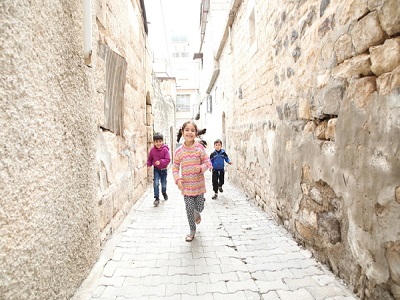Cover image: © UNICEF/UN0340074/Ergen
Children learn more quickly during their early years. They need a lot to develop their full potential.
Findings of research in neuroscience and parenting, provide evidence on the lifelong benefits of investing in the earliest years. At the same time, research findings have demonstrated that home visiting programs can increase parental well-being and parenting efficacy, as well as child outcomes.
The courses contained in the resources for home visitors were designed to upgrade and enhance the role of home visitors and to provide them with essential knowledge and tools in order to support and engage the families of young children. Well-trained, respectful, sensitive and family centred home visitors can build on this motivation and contribute to strengthening parenting competencies family resilience and children well-being.
The modules were prepared through a consultative process involving international and regional experts, national trainers and home visiting professionals. Because parenting is mediated by cultural values and beliefs, these generic courses can be adapted to specific country contexts and enriched with local examples and tools.
The courses encourage home visitors to take a strengths-based approach, to promote robust caregiver-child relationships and contribute to reducing risk by supporting and referring families to other services as needed. We trust that training based on these courses will enable home visitors to develop positive, respectful and sensitive relationships with families; help them to assess regularly the strengths and needs of individual children and their caregivers; and assist them to support and empower parents for informed actions and decisions with regard to their young children’s health, wellbeing and development.
Learning objectives
By the end of this module you will develop a good understanding of:
- What is child development.
- How the foundations for the individual’s development are laid in the early years.
- Developmental domains Brain development in the early years.
- The importance of nurturing, secure, stimulating, predictable and responsive relationships for young children.
Methodology
This course is composed of seven sections, including various examples, activities and assessments. This e-learning activity can be taken as stand-alone course or as part of the Home Visitors resources modules .
Audience
- This course is intended for home visitors and home nurses to learn important information about early childhood development, so they can educate parents and caretakers on these techniques.
- This course is also open to parents, caregivers and UNICEF staff and UNICEF partners.
Length
It will take you about 1.5 hours to complete this self-paced course.
Structure
This course is composed of seven sections:
- Introduction
- Why early childhood is a time of endless opportunities
- What factors affect early childhood development
- The brain develops rapidly in the early years
- Early investments are the most effective
- Reducing risk factors-reinforcing protective factors
- Early Childhood Development is every child's right
Contact details
For content queries, questions and suggestions please contact Silvia Sanchez (sasanchez@unicef.org) Aleksandra Jovic (ajovic@unicef.org)
For technical issues, please contact the Agora team (agora@unicef.org)
